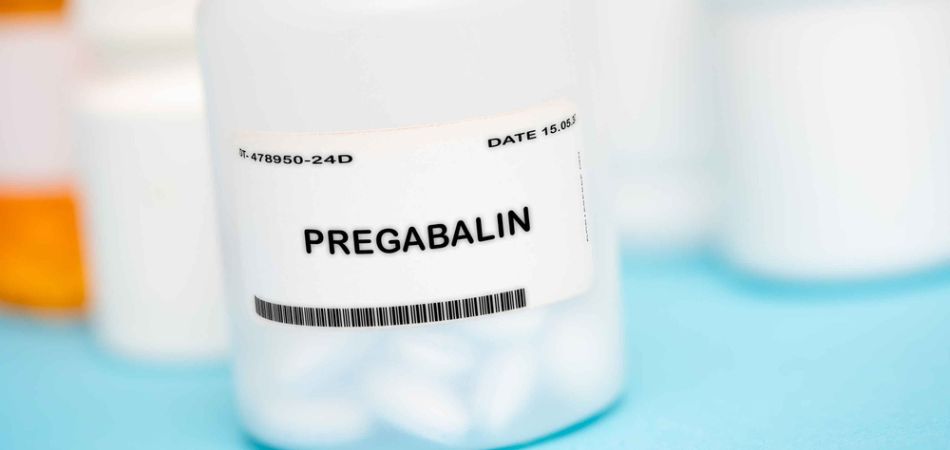Last Updated:
November 25th, 2025

Pregabalin was reclassified in 2019 as a “class-C controlled drug” to curb misuse and its increasing link with drug-related deaths. Simultaneously, research from the Pharmaceutical Journal suggests that prescriptions have increased by almost 25% since the reclassification.
So as its use increases, our general understanding of pregabalin’s interactions with other substances should rise with it.
This guide looks at the latent risks in mixing pregabalin with alcohol, and gives safe steps in avoiding or stopping cross-use of the two.
What is pregabalin?
Pregabalin is a type of medicine in the “anticonvulsant” group prescribed to treat people with various psychiatric and neurological conditions. The most common prescriptions are given for epilepsy, generalised anxiety disorder (GAD), severe nerve pain and fibromyalgia. It works by reducing the amount of pain signals sent out by damaged nerves across the body. It sometimes goes by the brand name Lyrica, Alzain and Axalid in the UK.
Pregabalin doesn’t work exactly like traditional painkillers, which generally work by blocking pain signals sent to the brain. Pregabalin alters the way in which nerves transmit signals, and its use stretches to a myriad of health conditions. In epileptic people, it is believed to stop seizures by reducing abnormal electrical activity in the brain. For nerve pain, it focuses on interfering with pain messages moving through the brain and spine.
Its wide stretching effects mean it is used for a broad collection of people suffering from health conditions. When taken as intended, it can have profoundly positive effects on a suffering person’s quality of life. However, it is sometimes misused for its relaxing and calming effects, and its dangers start to amplify when other substances like alcohol are in the system.
Why are pregabalin and alcohol sometimes mixed?
There are a multitude of reasons why people might take pregabalin while alcohol is in the system. Some of the most common can include:
- Misjudging how long pregabalin stays in the system: Pregabalin has a half-life of around six hours, can stay in the blood for more than a day, and may still be traceable in urine nearly a week later. Many people could overlook this and drink without realising their body still has trace pregabalin.
- Recreational misuse or self-medication: Some people turn to pregabalin for its sedating and calming properties, particularly if they struggle with insomnia or anxiety. In addition, many of us understand how alcohol feels like it “takes the edge off.” Together, they may be used to blunt uncomfortable feelings.
- Chasing a stronger sense of relaxation: Mixing the two can create what feels like a heightened calm, or a “floating” sensation. However, during and after the substances wear off, the body is being compromised.
What are the risks when pregabalin and alcohol are mixed?
When the two substances are taken together, the sedative effects can be multiplied. Both alcohol and pregabalin affect the central nervous system, meaning your brain and body are stepping on dangerous ground. The effects can be immediate, severe and long-lasting, which include:
Blackouts and memory loss
When alcohol and pregabalin are mixed, the likelihood of blackouts can significantly increase. In this state, a person might continue to move, talk, or loosely interact, but have marginal or missing recollection the next day. This can potentially be very damaging to relationships with the people you’re with, or put your own safety at risk.
Heavy central nervous system depression
The two substances taken together will have a great effect on your central nervous system, impairing activity in areas linked to breath control and motor coordination. Their paired effects often cause severe drowsiness, slurred speech, loss of balance and slowed breathing. When taken in large amounts, it is not uncommon for a person to slip into unconsciousness.
Higher risk of overdose and death
Both alcohol and pregabalin place a heavy strain on the respiratory system. In large amounts, they can cause breathing to become dangerously shallow or even stop. While pregabalin may not be linked to as many deaths as opioids, there is still the risk of overdose, especially if a lot of alcohol is consumed alongside it.
Worsening mental health
Though the intention of mixing the two drugs may be to find relaxation, the opposite is found in the long run. A person’s mental state can plummet when mixing the two, leading to heavy bouts of depression and mood instability. Some research from the British Medical Journal reports that for young people between 15 and 25, taking gabapentinoids like pregabalin resulted in a 26% increase in suicidal ideation. The escalation to suicidal thoughts means that seeking professional help may be paramount.
An entryway to addiction or relapse
Both substances carry a risk of dependence when used alone. Taken together, the likelihood of developing an addiction rises even higher. Alcohol is known to increase risk-taking behaviours, so a person can overlook the latent dangers of mixing the two as they drink. For people already i recovery, taking the two will likely become a powerful trigger for relapse, undoing their hard work and the journey trodden so far.
How can I safely stop cross-use?
If you or someone you care about is mixing pregabalin with alcohol, risks are already being run. However, it is also vital to recognise that stopping suddenly without any support can become dangerous too. As both substances affect the brain and CNS, withdrawal can bring uncomfortable and even dangerous symptoms.
Key stops to help you quit safely include:
- Learn the risks of sudden withdrawal: There are risks involved with the sudden cessation of alcohol, including seizures, hallucinations and, in severe cases, delirium tremens (DTs). Speak to a healthcare provider or research credible sources for the dangers of suddenly stopping and entering withdrawal.
- Research the importance of medical detox: For those with long-standing addictions, working your way out of dependence is much safer when you’re supported by detox professionals. They help to mitigate symptoms and provide medication if needed, keeping your body safe as it stabilises.
- Look into therapy and support for sustained healing: There is strength in recovery when you’re around others who understand your pain. Therapies like CBT and DBT can help you understand the drivers that keep you using a substance. Ongoing aftercare can be a wellspring of support in preventing relapse, helping you sustain sobriety and work towards a brighter future.
Recognising the dangers and risks in sudden cessation can be the first step before seeking the professional help you need and deserve. Let recovery be the foundation for lasting change and the key that opens the door to regaining control of your life.
Where can I get help for the addiction I face?
If you’re caught in an addiction to pregabalin or alcohol, or in cross-using other substances, there may be times when you don’t know where to turn. We want you to know that we’re here for you, and you don’t need to carry the burden alone.
At Recovery Lighthouse, we specialise in detox for both single and cross-used substances. Our experts use evidence-based therapies to help you address and eventually reframe the drivers of addictive behaviour.
Reach out to us today. Our team is ready to kick-start your recovery.


